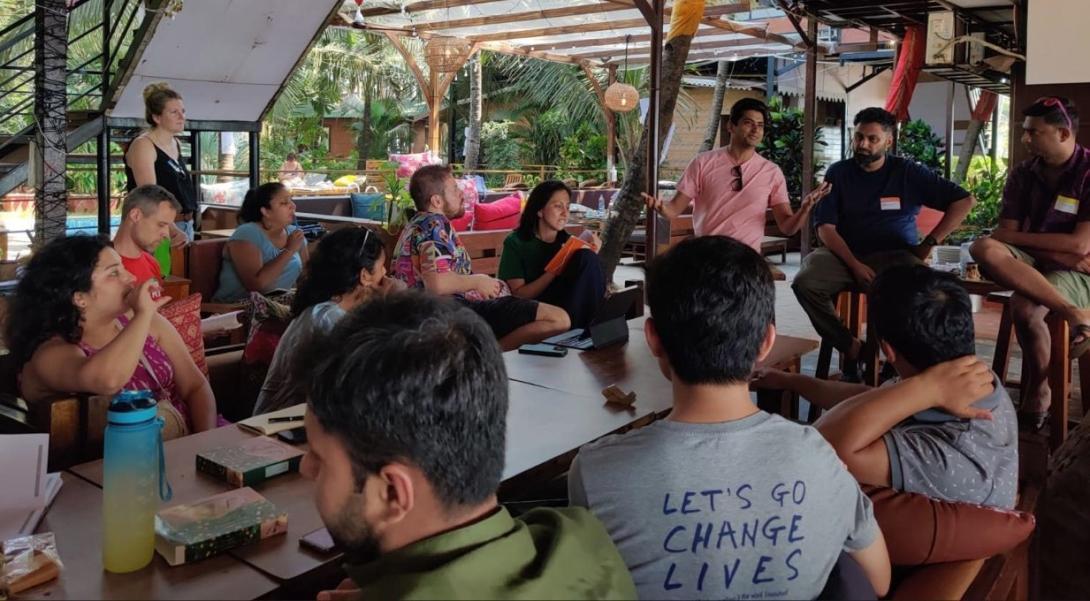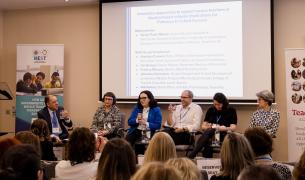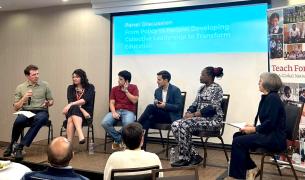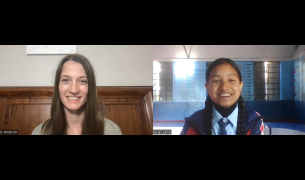Teach For All’s Alumni Social Entrepreneur Community gathers to focus on scale—and mutual support

In countries across the globe, alumni of Teach For All network partners are developing and launching social enterprises inspired by their experiences teaching in marginalized communities during their fellowships. Since 2018, Teach For All has been fostering a global community of over 50 alumni social entrepreneurs who are leading thriving organizations so that they can learn from and support each other to increase their impact. In late 2023, 24 of these alumni social innovators came together in Goa, India to exchange insights on the theme of “scale.”
The gathering included alumni of network partners in 12 countries across four continents. Their initiatives address a variety of social issues that impact children and families in under-resourced communities, including improving girls' education, developing media literacy, teacher development, school leader development, and educating refugees amongst others. “It was a diverse mix,” explained Teach For Lebanon alumnus and Co-founder of Nafda Lebanon, Fahd Jamaleddine. Attendees included alumni “impacting hundreds to hundreds of thousands of students, scaling in more than 100 cities or generating $1B of total benefits.”
The Social Entrepreneur Community organized the event themselves with the support of Teach For All. They raised funds to pay for the group’s accommodation and food from local donors in India, and split into small volunteer committees who took charge of designing the event’s learning agenda, team building activities, and logistics. Through Teach For All’s Communities & Connections Fund, they applied for and received funding to support the travel costs of 16 attendees, as well as Spanish interpretation.
Throughout the three-day event, the group took a variety of approaches to exploring the concept of scale—from small group consultancy protocol workshops where members shared challenges and received peer support, to “lightning talks” (rapid-fire TED-style talks by members of the community on a specific issue), and full group “deep dives” on particular shared topics of interest. The following key insights were generated from the discussions:
- On partnering with governments: Many entrepreneurs have found working with the government an important vehicle to scale. Having an orientation towards co-creating plans with government bodies, making sure that government goals and priorities are centered in partnerships, and ensuring that any credit for impact goes to the government (rather than social enterprises) are strategies that have helped entrepreneurs build trust and ongoing partnerships with governments.
- On fundraising: When entrepreneurs have shifted from the mindset of “there is a scarcity of funding” and adopted a mindset of “there is enough money in the system, I just need to find ways to unlock it”—and approached funders asking the question, “How can my organization help you to achieve your goals?”—it has led to successful fundraising efforts. In addition, investing in capturing and curating stories of impact and regularly sharing these with funders (via quick, informal WhatsApp messages or email) has been an effective way of maintaining funder confidence and support, and keeps organizations on supporters’ minds.
- On mobilizing volunteers: Entrepreneurs who have designed their volunteer strategy using the MECR approach (Magic – create a magical experience for volunteers that truly shifts something for them; Equality – treat volunteers as equals, not beneath; Communication – ensure regular, transparent, clear communication; Repeat – building in rituals and rhythms to maintain volunteer commitments) have been able to leverage volunteers effectively.
- On organizational positioning: Entrepreneurs who have found ways to position themselves and their organizations as experts in a particular field have found it easier to forge coalitions and partnerships which help enable scale. Creating podcasts, sharing blog posts, posting content on LinkedIn and in other professional spaces have helped build credibility and led to entrepreneurs being seen as an influential voice in the space.
- On personal sustainability: Entrepreneurs recognized that system change is a long game—a marathon not a sprint—and thus requires them as organizational leaders to carve out time for rest and re-energizing, and building healthy habits to ensure they can sustain themselves and encourage a culture of sustainability at their organizations.
In addition to the exploration of scale and a deepening of relationships among the members of the community, several high-impact cross-border initiatives emerged from the event, including a mentorship exchange between organizations in the UK and India, two entrepreneurs considering collectively approaching a funder, and alumni of three network partners committing to re-energize their alumni entrepreneur communities back home.
“Every space was filled with so much learning, wisdom, openness, and vulnerability,” shared Purva Parwani, a Teach For India alumna and Co-founder and COO of Claylab Education Foundation. “I would mostly find myself writing pages & pages of notes, holding back tears during sessions, inspired and blown away by all that we've all been collectively doing despite the many challenges life throws at us.”



